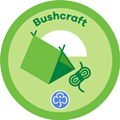

Interest badges
Bushcraft

Have adventures
Live well in the wild
Bushcraft is all about living outside just using natural things to survive – nothing from a shop! Challenge yourself to go back to nature…
Getting a Rangers interest badge
There are 18 interest badges for you to earn at Rangers, and 3 fun challenges to do for each badge.
You can do these badges at any time, anywhere and in any way you’d like. You can do them on your own or with units, during unit meetings, at home or even on holiday.
How to complete this badge
1. Practise tracking
Learning to track animals will make sure you don’t ruffle anyone’s fur or feathers when you’re looking for safe and practical camping spots out in the wild.
You don’t want to pitch your tent near sets of angry badgers, for example!
Get outside – go to a wood, garden, park or to verges or public green spaces in your neighbourhood. Look for animal tracks and signs of life. Try to identify where animals live, but don’t disturb them. Find and identify footprints, trails, fur and feathers.
Record what you find and evaluate what indicators helped you identify and track animals and birds. How many species can you track in your local area?
2. Make your own rope
When you’re out in the wild, it’s handy to be able to make your own tools so you can build everything you need.
Have a go at making your own rope or cord. Use long grass or natural materials to make a length. If you don’t have access to natural resources, you can use recycled materials or old cloth.
Once you’ve made your rope, put it to the test! Practise tying knots with it. Use your rope to lift or secure different objects. You could even create your own lasso challenge!
3. Put your bushcraft skills to the test
This final challenge will put all your bushcraft skills into action!
Spend a night out camping, where you stay outside for at least 12 hours, and do 4 of the following bushcraft skills:
- Build and live in a shelter, tent or bivouac, made from natural resources.
- Light a fire without using lighters or matches.
- Cook on a fire or oven you made and lit yourself.
- Whittle, make or thatch your own tools and cutlery.
- Track and survey your camping area, and identify any natural hazards or risks.
- Identify 10 different bird and animal tracks.
- When scouting the area around your camp, navigate using only natural methods, such as making a sundial or stargazing.
- Use different knots to make something useful for your campsite.
Animal safety
- When tracking an animal, keep your distance so you don’t disturb them – especially if they're eating or sleeping.
- Never go near where an animal lives.
- Don’t feed wild animals.
- Always be kind to animals and their habitats.
Staying outside overnight
- Make sure someone knows your plans – where you're going, how long you'll be, what you’ll be doing and when you’ll be back.
- Have a way of contacting someone if you get stuck (for example, having a charged phone).
- Prepare properly for your nights away, including checking the weather.
Fire safety
- Never leave a fire unattended and wait until it’s fully extinguished.
- Always have a bucket of water/sand/earth nearby to extinguish the fire.
- Never light a fire on peat, under a tree or near shrubs/bushes.
- Tie your hair back and make sure clothes and jewellery are tucked in.
- Be aware of how the direction of wind could affect your fire.
Cooking safety
- Check the ingredients you use to make sure you, or other people eating, are not allergic to them.
- You should be supervised by an adult when cooking, and follow good hygiene rules.
- Tie long hair back and wash your hands before you start.
- Always use oven gloves when handling hot items.
Knife safety
- Always direct a knife away from your body when cutting, and use a cutting or chopping board.
- Always hold on firmly to what you’re cutting and keep your fingers away from the blade.
- If you drop a knife, do not try to catch it. Step back and pick it up once it has landed.
Out and about safety
- Plan your route before you go.
- Make sure someone knows where you're going and when you’ll be back.
- Pay attention to what’s happening around you. Only do your activity when you are somewhere safe.
- Always keep to the Green Cross Code and remember to wear reflective or bright clothes/accessories. When you’re out at night, wear reflective clothing or accessories like reflective armbands.
- Have a way of contacting someone if you get stuck (for example, having a charged phone).

















